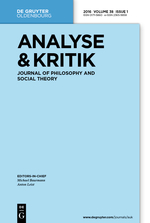Suchergebnisse
"Steven Lukes"
Titel: Is Analytical Action Theory Reductionist?
Autor: Ian Carter
Seite: 61-66
Abstract: Steven Lukes and Alasdair MacIntyre have accused analytical action theory of being motivated by reductionist aims and of ignoring the fact that what is distinctively human about actions is their essentially social character. These reductionist aims are said to 'subvert, the search for the distinctively human. Enterprises that have particularly come under fire (and which Lukes recommends ,abandoning,) are the search for 'basic' actions and attempts to solve problems regarding the 'individuation' of actions. Lukes and MacIntyre are mistaken however, both in their interpretation of the aims which motivate analytical action theory, and in their characterisation of the search for the distinctively human. 'Individuated' or 'basic' actions are not complex social actions reduced down to their 'simplest elements'. They represent attempts to resolve problems which arise prior to the examination of the social character of actions.
Titel: Reply to Four Critics
Autor: Gerald A. Cohen
Seite: 195-222
Abstract: This article is a response to criticisms of my book on Karl Marx's Theory of History which were made by four authors in last Decembers number of ANALYSE & KRITIK. After clarifying (section 2) an ambiguity in an argument for historical materialism which is presented in the book, I contend (3-5), against objections raised by Philippe Van Parijs, that historical materialism is consistent only if it explains production relations functionally, by reference to their propensity to develop the productive forces. Next (6-8) I address and rebut the views of Wal Suchting and Milton Fisk, who both think that the role of class struggle in historical materialism is larger than the one I assign to it. Finally (9-12) I try to vindicate the doctrine of base and superstructure proposed in my book against the skepticism of Steven Lukes.
Titel: Can the Base be distinguished from the Superstructure?
Autor: Steven Lukes
Seite: 211-222
Abstract: This article considers Cohen's claim that the economic structure or base can be conceived independently of the superstructure by adressing his attempt to identify "a rechtsfrei (moralitätsfrei, etc.) economic structure to explain law (morals, etc.)". It examines his programme of presenting relations of production as a set of (non-normative) powers and constraints that 'match' the rights and obligations of property relations. It is argued that, first, Cohen does not carry through this programme rigorously but, second, he could not do so, since it cannot be carried out at all. Three arguments are advanced, the first two against the possibility of a determinate ,objective, account of such powers and constraints, the third against the possibility of abstracting norms (constitutive and regulative, formal and informal) from contractual relationships: it is argued that one cannot identify the powers and constraints embodied in norm-governed economic relationships independently of the norms which govern them. Alternative interpretations are considered of Cohen's programme that might escape these objections, but these are rejected as untrue to his purpose, and in any case ineffective. It is concluded that Cohen fails to distinguish base from superstructure in the manner required.
Titel: Sacred Values in Secular Politics
Autor: Steven Lukes
Seite: 101-117
What role does sacredness play in the secular politics of the liberal democracies of the United States and Europe today? One approach, focusing on the sources of political unity, suggests that they are integrated by a kind of civil religion, however flawed. This suggestion is criticized empirically as ever less plausible and as blind to the currently feasible limits of social solidarity. A second approach, focusing on the growing democratic crisis of liberal democracies due to ever-deepening social divisions, leads to the suggestion that sacredness is increasingly at work in secular politics. As attachment to organized religion declines so does the public deliberation and negotiation of conflicting interests - the arguing and the bargaining that democracy requires.
Titel: Capitalism, Justice, and the Boundaries of Liberalism
Autor: Steven Lukes
Seite: 31-39
The argument of Katrina Forrester’s In the Shadow of Justice explains the present neglect of Rawlsian thinking in the social and political world beyond academia. She there convincingly shows how its deep assumptions, conceptual framing and narrow view of what constitutes politics disabled it from grappling with the subsequent massive transformations of capitalism. Her second argument, advanced in her article and questioned here, offers an ideology critique of Rawlsian thinking that claims, in its strongest version, that such thinking fails to acknowledge that capitalism is not reformable and that this failure derives from its liberal assumptions. What is needed, she claims, is a critique that implies the feasibility of attaining a post-capitalist world that is based on a theory that goes beyond the boundaries of liberalism.

Sacred Values Today
2017 (39) Heft 1
Editorial
Religion captures our attention nearly every day, even if more often now in the form of religious terrorism. Christians are struck by the difference in belief and attitudes manifested in Islamic cultures and politics. Observers also are speechless how the Jewish religion is used to instigate and justify, within a democratic society, the aggressive occupation of foreign land. And even among the core countries of ’Western secularist enlightenment’ in Europe and the US, religion seems to underg...